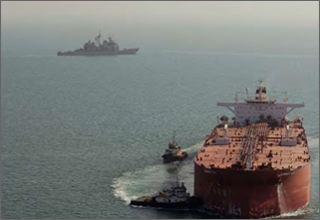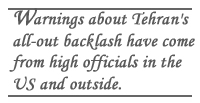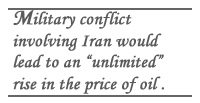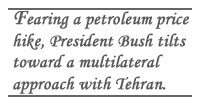Revisiting the “Axis of Evil” – Part I
Revisiting the “Axis of Evil” – Part I

LONDON: As the debate on Iran rages in the United States, the hawks need to examine the 2003 Iraq War and its aftermath, pondering the wisdom of George Santayana – "Those who fail to learn from history are doomed to repeat it." Defeating President Saddam Hussein's army was the easy part; what followed proved catastrophic for both the United States and Iraq.
Now, the Pentagon's two aircraft carriers stationed in the Persian Gulf have the coordinates for the Iranian targets. So too has the Israeli air force. As for the timing, some hawks see a window of opportunity for US President George Bush to strike Iran between the US presidential election November 4 and the inauguration of his successor on January 20, 2009.
But, no matter when the US or Israel accomplishes its self-appointed mission, the key question remains: What then? The short answer is Iran's response will be intense and all-encompassing.

The warnings about Tehran's all-out backlash have come from high officials in the US and outside. "I think everybody recognizes what the consequences of any kind of conflict [in Iran] would be," said US Defense Secretary Robert Gates. His "everybody" includes Admiral William Fallon, former commander of the Central Command (CENTCOM), in charge of waging wars in Iraq and Afghanistan. Fallon's premature retirement in April resulted from an article, based on his interview, in Esquire magazine, which portrayed him as the man standing between Bush and military strikes on Iran.
In his interview, Fallon said that "five or six pots boiling over [in the Middle East], our nation can't afford to be mesmerized by one problem [of Iran]." Earlier, on Al Jazeera satellite channel, he was more direct: "This constant drumbeat of conflict... is not helpful and not useful,” he said. “I expect that there will be no war, and that is what we ought to be working for."
Tehran's military commanders have reiterated that they would promptly fire missiles not only at Israel but also US targets in the region as well as those of Gulf monarchies complicit in any attack on Iran. With the Pentagon maintaining 32 military bases in the area, its forces are vulnerable to hits by Iran's short-range missiles.
After Iran's immediate military response will come asymmetrical warfare, which would destabilize the US-backed governments in Iraq and Afghanistan, endanger output and shipment of oil in the region, and trigger rocket attacks on Israel by Hezbollah in Lebanon and Hamas in the Gaza Strip.

As the first Shiite Islamic state on the planet, the Islamic Republic of Iran enjoys fervent loyalty of most Shiites in the Muslim world. In particular, Shiites in the Middle East and Afghanistan hold Iran's theocratic regime in high esteem. Shiites are 60 percent of the population in Iraq and 65 percent in Bahrain, where the US Fifth Fleet is based. In Kuwait, smaller in area than New Jersey, Shiites are 25 percent of the population. Shiites, though only 10 percent of Saudi nationals, are concentrated in the oil-rich Eastern Province of Saudi Arabia.
It's widely known that Iran's intelligence service has sleeper cells throughout the Gulf region and Afghanistan and could activate these cells to wreck US military facilities.
The currently quiescent Shiite militias in Iraq will resume their militant resistance against the US forces in Iraq. The fragile government of Prime Minister Nouri al Maliki, a staunch Shiite, who at crucial moments has journeyed to Tehran for consultations, will find itself struggling to survive. Already the Sunni president of Afghanistan, Hamid Karzai, has opposed the idea of his country being used to attack Iran.
Mohamed ElBaradei, director-general of the International Atomic Energy Agency, forecast the whole region turning into "a fire zone" following military strikes against Iran. "When one starts such actions in the Middle East, one cannot manage reactions that can spread over years or even decades," warned Syrian President Bashar al Assad.

Then there's oil, the life blood of the world's economies. Iran is the second largest producer in the Organization of Oil Exporting Countries. A military conflict involving Iran, warned OPEC's Secretary General Abdalla Salem El Badri, would see an "unlimited" rise in oil price: Any reduction of shipments through the narrow Straits of Hormuz could not be replaced. Hostilities in the Gulf of Hormuz, through which 40 percent of world oil supplies flow, would sharply reduce oil supplies.
Oil futures are extremely sensitive to the state of play in the hydrocarbon-rich Persian Gulf. Within days of the news that William Burns, a US State Department official, would join the diplomatic team, led by the European Union's foreign policy chief, Javier Solana, for July 19 talks with Iran's Saeed Jalili in Geneva, the price of oil fell by 12 percent.
With the soaring price of oil leading to a spurt in the cost of everything, from food to consumer items, the scene is set for the inflation to climb. Buffeted by the sub-prime mortgage crisis for the past year, a slump in the housing market and rising inflation, US Federal Reserve Bank and Treasury Department chiefs are scrambling to defuse one crisis after another and keep recession at bay.
Recent history shows that when the US is in recession, the party in power in Washington loses. That's what happened to President Jimmy Carter, a Democrat, in 1980 and to George H.W. Bush, a Republican, in 1992.
A decline in oil price is a prerequisite for circumventing recession. And that’s linked with excluding military action against Iran.

As it is, of the four topmost policymakers in Washington, Gates and Secretary of State Condoleezza Rice remain committed to pursuing diplomacy, with Vice President Dick Cheney favoring military strikes. Bush continues to display a split mind – a contrast to what happened in 2003, when Bush, Cheney and Defense Secretary Donald Rumsfeld were all for invading Iraq and ignored the ambivalent Secretary of State Colin Powell. Now, fearing a calamitous petroleum price hike caused by nervous oil traders, Bush is tilted toward a multilateral approach to Tehran.
In the diplomatic arena, however, the key missing element is the security guarantee for Iran. It was left to Thomas Fingar, director of the US National Intelligence Council, to point out this lacuna. "Iran has real security needs," he said July 9, adding "We are part of the reason Iran feels insecure."
When, in the course of preparing a package of incentives for Iran by six nations in mid-May, Russia raised the idea that the group should give Iran security guarantees to ease Middle East tensions. Bush dismissed the idea summarily.
As a veto-wielding permanent member of the UN Security Council, Russia counts. Its foreign minister, Sergei Lavrov, has pointed out that neither the US nor Israel offers any evidence that Iran is pursuing a nuclear-weapons program. Indeed, Washington's own National Intelligence Estimate, released in December, stated that Iran had ceased working on a nuclear military program in autumn 2003.
While politicians and experts dabble in speculation, military commanders are mandated to prepare plans for dealing with worst scenarios.
So what Retired General John Abizaid, commander of CENTCOM from July 2003 to March 2007, has to say is worth pondering. "I believe that we have the power to deter Iran, should it become nuclear," he said in his talk at the Center for Strategic and International Studies, a Washington think tank. "There are ways to live with a nuclear Iran. We lived with a nuclear Soviet Union, we've lived with a nuclear China, and we're living with [other] nuclear powers as well."
Dilip Hiro is the author of “Blood of the Earth: The Battle for the World's Vanishing Oil Resources,” published by Nation Books, New York; Politico’s Publishing, London; and Penguin Books, New Delhi. Click here to read an excerpt.